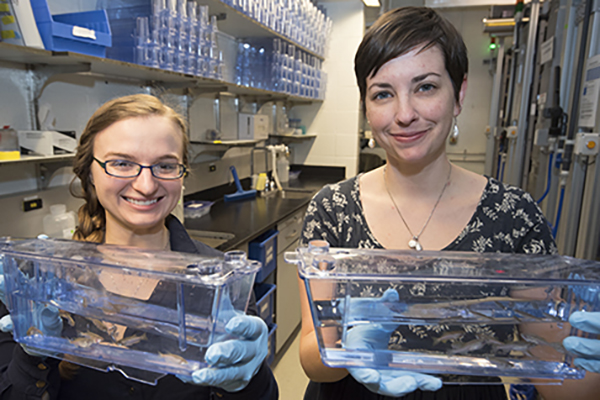Med Campus students win Neuro Startup Challenge
A team of Washington University students on the Medical Campus recently won top honors in the Neuro Startup Challenge, a biotech startup competition designed to commercialize promising brain-related discoveries of scientists at the National Institutes of Health (NIH).The team developed a business plan to commercialize a test for patients with multiple sclerosis.
New target identified in fight against Alzheimer’s, multiple sclerosis
Highlighting a potential target in the treatment of
multiple sclerosis (MS) and Alzheimer’s disease, new research suggests
that triggering a protein found on the surface of brain cells may help
slow the progression of these and other neurological diseases.
Scientists find gene vital to central nervous system development
Using Washington University’s state-of-the-art zebrafish facility, scientists have identified a gene that helps regulate how well nerves of the central nervous system are insulated. The finding may have implications for human diseases such as multiple sclerosis, in which this insulation is lost.
Study helps explain why MS is more common in women
A newly identified difference between female and male brains with multiple sclerosis (MS) may help explain why so many more women than men get the disease, researchers at Washington University School of Medicine in St. Louis report.
Washington People: Thy Huskey
p.MsoNormal, li.MsoNormal, div.MsoNormal
{margin:0in;margin-bottom:.0001pt;font-size:12.0pt;font-family:Cambria;}
.MsoChpDefault
{font-family:Cambria;}
@page WordSection1
{size:8.5in 11.0in;margin:1.0in 1.25in 1.0in 1.25in;}
div.WordSection1
{page:WordSection1;}
Thy Huskey, MD, works with patients who have had traumatic brain injuries and strokes, developing treatment plans and overseeing the therapy needed to help them regain function, daily living skills and independence. She relates very well to patients with neurological diseases, as she deals with one herself.
Multiple sclerosis research links brain activity to sharper cognitive decline
When it comes to communication in the brain, more is usually better. But now scientists, including Maurizio Corbetta, MD, have linked increased communication in a network of brain regions to more severe mental impairment in patients with early-stage multiple sclerosis (MS).
Multiple sclerosis blocked in mouse model
Scientists have blocked harmful immune cells from entering the brain in mice with a condition similar to multiple sclerosis (MS), believed to be caused by misdirected immune cells that enter the brain and damage myelin, an insulating material on the branches of neurons that conduct nerve impulses.
Goate appointed director of Hope Center for Neurological Disorders
Alison Goate, PhD, has been named director of the Hope Center for Neurological Disorders, a partnership between Washington University School of Medicine in St. Louis and Hope Happens, a nonprofit foundation that supports research into neurodegenerative disorders.
Central nervous system beckons attack in MS-like disease
Eliminating a molecular signal can help protect a neuron (show here) from destructive immune system cells.It may sound like a case of blame the victim, but researchers at Washington University School of Medicine in St. Louis have shown that cells in the central nervous system can sometimes send out signals that invite hostile immune system attacks. In mice the researchers studied, this invitation resulted in damage to the protective covering of nerves, causing a disease resembling multiple sclerosis. The researchers found that they could prevent destructive immune cells from entering nervous system tissue by eliminating a molecular switch that sends “come here” messages to immune cells.
Central nervous system beckons attack in MS-like disease
Eliminating a molecular signal can help protect a neuron (show here) from destructive immune system cells.It may sound like a case of blame the victim, but researchers at the School of Medicine have shown that cells in the central nervous system can sometimes send out signals that invite hostile immune system attacks. In mice the researchers studied, this invitation resulted in damage to the protective covering of nerves, causing a disease resembling multiple sclerosis. The researchers found that they could prevent destructive immune cells from entering nervous system tissue by eliminating a molecular switch that sends “come here” messages to immune cells.

